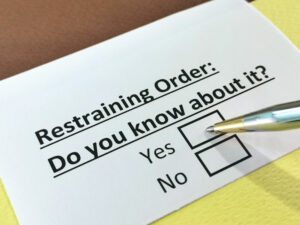Various Types of Restraining Orders in NJ
Seasoned Attorneys Handling the Distinct Types of Restraining Orders in Woodbridge and across New Jersey
 When a victim of domestic violence needs protection, they can get assistance from the courts. Restraining orders are available to those adults or emancipated minors who can show a judge that they suffer or suffered abuse and need orders from the court to keep them safe. Thus, New Jersey’s Prevention of Domestic Violence Act (PDVA) allows an individual injured by their intimate partner, whether a spouse, partner, date, or parent to their child, to obtain a restraining order prohibiting the accused from contacting the victim by any means. Depending on the parties’ situation, the restraining order may provide additional protection and other forms of relief. For example, the order will require the accused to surrender firearms in their possession, and perhaps to pay reparations, or support their children. In all, three main types of restraining orders are available to fit the needs of the party needing protection.
When a victim of domestic violence needs protection, they can get assistance from the courts. Restraining orders are available to those adults or emancipated minors who can show a judge that they suffer or suffered abuse and need orders from the court to keep them safe. Thus, New Jersey’s Prevention of Domestic Violence Act (PDVA) allows an individual injured by their intimate partner, whether a spouse, partner, date, or parent to their child, to obtain a restraining order prohibiting the accused from contacting the victim by any means. Depending on the parties’ situation, the restraining order may provide additional protection and other forms of relief. For example, the order will require the accused to surrender firearms in their possession, and perhaps to pay reparations, or support their children. In all, three main types of restraining orders are available to fit the needs of the party needing protection.
Navigating the Types of Restraining Orders in Domestic Violence Situations in NJ
The first two types of orders, temporary restraining orders (TRO) and final restraining orders (FRO), typically arise from domestic violence complaints. A petitioner may get a restraining order through the local police station after hours or the Family Division in superior court during regular court operating hours. The police help victims speak to a municipal court judge to get the order outside regular court business hours. A victim can sit down with an officer at the police station or the scene of a domestic violence incident. If officers arrive at the scene of domestic violence, they may arrest the accused if the victim is blatantly injured. Alternatively, they can advise the victim to seek a restraining order at the local courthouse.
Temporary Restraining Orders (TRO)
A Temporary Restraining Orders TRO usually issues from the court on an ex parte or emergency basis when a petitioner testifies in writing, personally or telephonically to a judge about the violence. The petitioner relates the details of the defendant’s assault, stalking, harassing, or otherwise harming them. The PDVA also includes terroristic threats, criminal mischief, criminal restraint, false imprisonment, sexual assault, criminal sexual contact, lewdness, and cyber harassment as some of the 19 domestic violence crimes. If the petitioner fills out the required forms, evidencing their need for protection, a judge orders the TRO, typically without the defendant present. Law enforcement then serves the defendant with the TRO and FRO hearing date. When serving the TRO, the police may confiscate the accused’s weapons.
Final Restraining Orders (FRO)
The final restraining order order follows ten days later at a hearing open to all parties present. That is when a judge decides whether the evidence does or does not support the victim’s abuse allegations. The FRO hearing permits the accused and accuser to prove their side of the story with witnesses, police reports, photographs, and other evidence to persuade the judge that alleged violence did or did not occur. To grant the FRO, the judge must find the parties have a domestic relationship, meaning the parties live together or once lived together or dated. In addition, the judge must establish that one or more of the listed crimes in the PDVA occurred, and the order is necessary to prevent further harm.
If the petitioner is successful, they get the FRO. If the defendant convinces the judge that no domestic violence occurred or the alleged victim is not fearful for their safety and has no reason to be, the judge does not grant the FRO, and the TRO is no longer in effect. After a judge makes a ruling for the petitioner and finalizes the restraining order, the defendant pays a fine, submits their fingerprints and photo for a state database, and surrenders any firearms. Once a FRO becomes law, the order is permanent and remains in effect until a court terminates it by request and reasons presented by either party. Otherwise, the defendant must follow the FRO or chance a criminal contempt conviction. Violating any type of restraining order is easy if a defendant is not careful. Contacting the victim in person or electronically is a violation, even one text or phone call.
Exploring Restraining Orders Outside of the Domestic Violence Sphere
If the basis of the protective order is sexual assault or another illicit sexual contact, the order differs slightly. The third restraining order is for sexual assault victims. The legislation responsible for permitting emergency sexual assault restraining orders is the New Jersey Sexual Assault Survivor Protection Act. Victims who prove that they experienced unconsented-to sexual penetration or contact or suffered offense by the accused’s lewd acts can petition the court for a restraining order. Like the domestic violence TRO, the judge grants the order if they find the victim needs protection for their safety s security.

Get Experienced Legal Guidance on All Types of Restraining Order Matters in NJ
All three restraining orders restrict a defendant under threat of contempt and possible jail time. Suppose you must answer to a charge of domestic violence or illicit sexual behavior in a civil restraining order petition. In that case, you might want to hire an attorney with experience in this area, both civilly and criminally. Often, domestic violence involves criminal charges as well as civil restraining orders. And sex crime convictions require you to register as a sex offender, which can affect your life dramatically. Restraining orders also affect your life significantly, so you want to have the best representation to help you defend against a protective order. For example, an FRO could jeopardize your immigration status. Likewise, victims of domestic violence and sexual assault needing help presenting their case to a judge benefit from the legal expertise of a talented restraining order attorney. Find an experienced lawyer at The Tormey Law Firm who frequently addresses the civil and criminal consequences of domestic violence and sexual assault restraining orders in Paterson, Linden, Hoboken, Morristown, Somerville, Hunterdon, Union, and throughout NJ. Contact (908)-336-5008 for a free legal consultation today.



